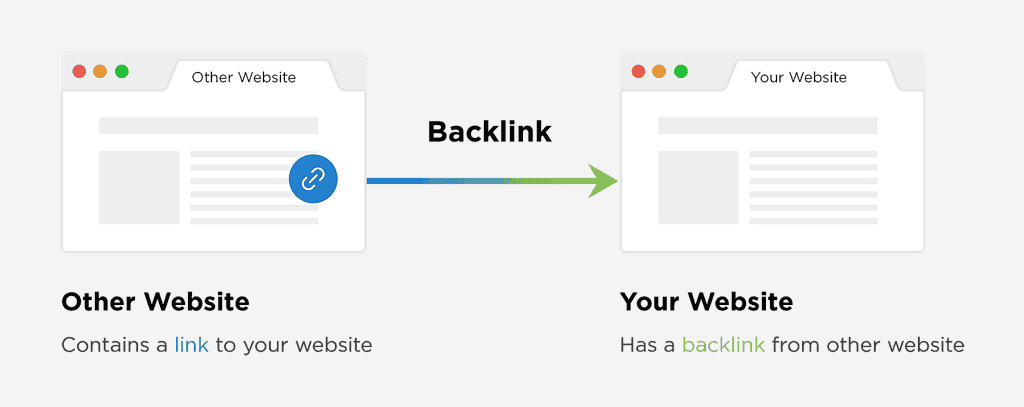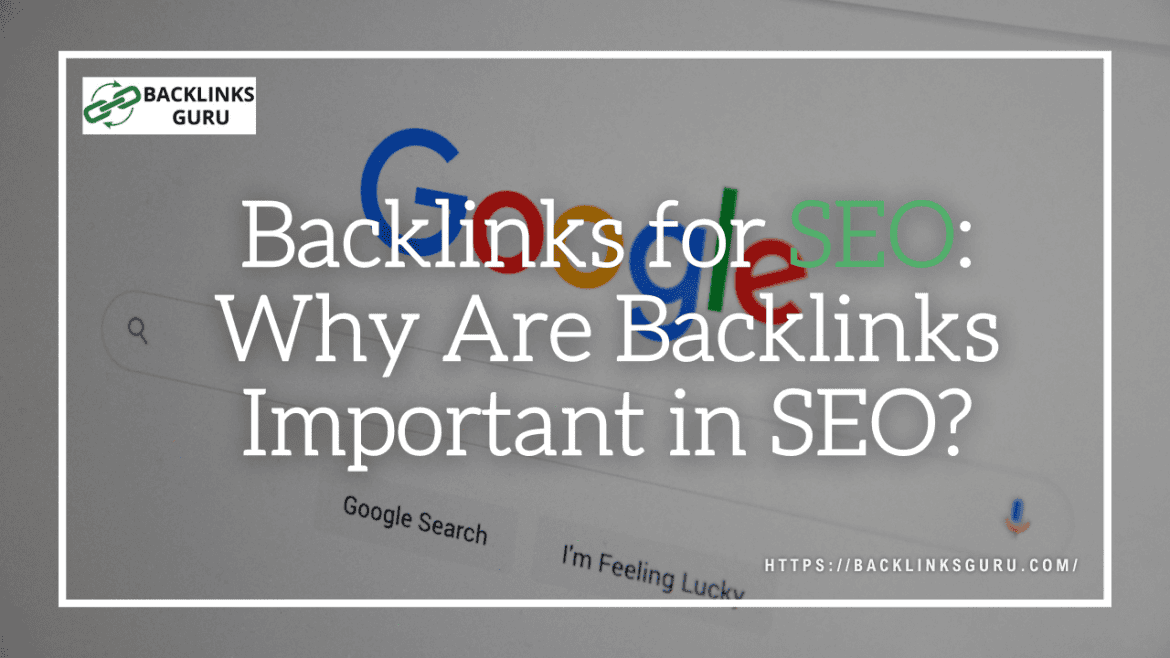Discover How Quality Backlinks Boost Rankings, Build Authority, and Drive Organic Traffic to Your Website
In the realm of search engine optimization, backlinks stand as a cornerstone of effective SEO strategies. These links from other websites, also known as inbound links, are essentially votes of confidence from one site owner to another, indicating that the linked content is valuable and trustworthy. Understanding what backlinks are, the types of backlinks available, and why backlinks are important for SEO is crucial for SEO success in today’s competitive online landscape.
Understanding Backlinks
What Are Backlinks?
Backlinks are links from one website to another, acting as a referral or citation. In the context of search engine optimization, a backlink represents a vote of confidence from another website. Search engine algorithms interpret the creation of backlinks from reputable and authoritative sites as a signal that your website offers valuable and trustworthy content. The number of backlinks you have, along with the best backlinks. Quality backlinks and authority of the linking sites, significantly impacts your website’s ranking in search engine results pages. Thus, the importance of backlinks in improving your SEO value cannot be overstated.
Types of Backlinks
There are several types of backlinks, each carrying different weight and impact on your website’s SEO. It’s helpful to understand some of the key differences between them:
1. Guest Post Backlinks
We publish high-quality, niche-relevant articles on authoritative websites that include your backlink naturally within the content. These editorial links help build trust and boost search engine rankings.
2. Niche Edit Backlinks (Contextual Links)
We place your link within existing aged content on trusted blogs. This gives you an instant SEO advantage, as the content is already indexed and has built up authority over time.
3. Dofollow Backlinks
These backlinks pass SEO value (“link juice”) to your website, helping increase your domain authority and improve keyword rankings. We focus on building clean, white-hat dofollow links from trusted sites.
4. NoFollow Backlinks
While NoFollow backlinks don’t pass direct link juice, they still play a valuable role in creating a natural and diverse backlink profile. They help build trust, drive referral traffic, and prevent over-optimization in your SEO strategy.
5. Homepage Backlinks
Links from the homepage of authoritative websites carry significant weight in terms of backlink in SEO. These backlinks are ideal for giving your site a strong push in search rankings.
6. Web 2.0 Backlinks
Built on free blogging platforms like Medium, WordPress, and Blogger, Web 2.0 backlinks are perfect for diversifying your link profile and supporting tiered link-building strategies.
7. Cloud Backlinks
We create SEO-friendly content and host it on cloud platforms like Google Drive, Dropbox, and Amazon S3. These links help with indexing and add trust to your backlink profile.
8. Local SEO Backlinks
For businesses with a local focus, these backlinks come from local directories, blogs, and geo-targeted sources—helping you rank better in local search results.
Additionally, editorial backlinks are considered high-quality because they are earned organically, rather than through paid promotions, further demonstrating the importance of backlinks for SEO.
High-Quality Backlinks
Not all backlinks for SEO are created equal. High-quality backlinks are those that come from authoritative, relevant, and trustworthy websites. These backlinks from reputable sources signal to search engines that your website is also credible and valuable. To build backlinks, focus on creating content that other sites will naturally want to link to. Avoid tactics that may result in spammy backlinks, as these can negatively impact your SEO. Using an SEO tool to check your backlinks and monitor your backlink profile is essential for maintaining a healthy and effective SEO strategy. Obtaining or building high-quality backlinks is an integral aspect of off-page SEO.

The Importance of Backlinks in SEO
Why Backlinks Matter for SEO
Backlinks play a pivotal role in determining a website’s SEO performance. Search engine algorithms consider backlinks as votes of confidence from another website, which signifies the value and relevance of the content. When site owners create backlinks from high-quality and authoritative sources, it improves the credibility and trustworthiness of the linked page. Consequently, a greater number of backlinks from reputable domains can significantly boost a website’s ranking in search engine results, enhancing its visibility and driving organic traffic to your site. Understanding the importance of backlinks for SEO is crucial for SEO success, and effective link building strategies yield the best backlinks. SEO strategies must prioritize high quality backlinks. building high-quality backlinks.
Backlinks and SEO: The Connection
The connection between backlinks and SEO is undeniable, forming a core aspect of digital marketing strategies. Search engine optimization relies heavily on backlinks as a ranking factor, as they indicate the authority and relevance of a website within its niche. When backlinks are created from relevant and reputable sites, it signals to search engines that your website offers valuable and trustworthy content. Moreover, SEO backlinks from diverse and authoritative sources can improve a website’s overall domain authority, leading to better organic search performance. Therefore, incorporating a link building is crucial for SEO, as it helps you earn high quality backlinks. strategy focused on high-quality backlinks is essential for achieving sustainable SEO success and maintaining a competitive edge in the online landscape, making the importance of backlinks in SEO unquestionable.
Backlinks So Important for Website Authority
Backlinks are essential for establishing and boosting website authority, which is a critical factor in SEO. When backlinks from reputable and authoritative sites point to your website, it signals to search engines that your content is valuable and trustworthy. This endorsement helps improve your website’s credibility and authority within your industry. Building high-quality backlinks acts as a vote of confidence, telling search engines that other site owners find your content worthy of citation. The more high-quality backlinks a website has, the stronger its domain authority becomes, leading to improved search engine rankings and increased organic traffic to your site. Therefore, building high-quality backlinks is a fundamental aspect of SEO strategies and should be a primary focus for any site owner looking to enhance their online presence, highlighting the importance of backlinks for SEO.
Strategies for Building Backlinks
Link Building Techniques
Effective link building techniques are essential for optimizing backlinks for SEO and improving a website’s ranking. One fundamental technique is creating high-quality content that naturally attracts backlinks from another website. This involves developing informative, engaging, and shareable content that others in your industry will want to link to. Another key strategy is guest blogging, where site owners contribute articles to other websites in exchange for a backlink. Utilizing an SEO tool to check your backlinks and monitor your progress is also important. Ultimately, successful SEO strategies prioritize creating valuable content and actively promoting it to build backlinks from authoritative and relevant sources, thus underscoring the importance of backlinks for SEO.
How to Earn Backlinks
Earning backlinks is one of the most important (and rewarding) parts of SEO. Unlike paid links, earned backlinks are natural, meaning other websites link to your content because they find it useful, credible, or worth sharing. Here are some of the most effective ways to earn quality backlinks:
1. Create High-Value, Shareable Content
The foundation of earning backlinks is great content. Write blog posts, guides, infographics, case studies, or videos that provide real value to your audience. If your content is helpful, informative, or entertaining, others will naturally want to link to it.
2. Guest Posting on Niche Blogs
Reach out to reputable blogs in your industry and offer to write high-quality guest posts to secure new backlinks. This not only gives you a backlink but also helps build your authority and reach new audiences. (Pro tip: focus on blogs that are relevant to your niche and have good domain authority.)
3. Use HARO (Help a Reporter Out)
Sign up for HARO to connect with journalists looking for expert sources. If your quote or insight gets published, it often includes a backlink to your website. It’s a great way to earn powerful backlinks from high-traffic news sites.
4. Create Linkable Assets
Develop resources that others want to reference—like original research, statistics, tools, templates, or interactive content to generate lots of backlinks. These kinds of assets are highly linkable and can attract natural backlinks over time.
5. Build Relationships with Other Site Owners
Networking matters! Engage with others in your niche through social media, email, or communities. When you build real relationships, link-building opportunities happen more naturally through collaborations, mentions, and partnerships.
6. Get Featured in Roundups or Interviews
Many blogs publish expert roundups, interviews, or “top tools” lists. Reach out and pitch yourself or your content. These posts often link to contributors and can send you both traffic and SEO value.
7. Reclaim Unlinked Mentions
Use tools like Ahrefs or Google Alerts to find websites that mention your brand or content but haven’t linked to it. Politely reach out and request that they add a link—many are happy to do so.
Creating High-Quality Backlinks
Creating high-quality backlinks is paramount for effective SEO, as they significantly contribute to a website’s authority and search engine rankings. Begin by understanding the importance of backlinks for SEO. Focusing on creating exceptional, shareable content that addresses the needs and interests of your target audience is a good starting point. This content should be well-researched, insightful, and presented in an engaging format. To promote your content and get backlinks, contact other site owners and influencers in your field. Ensure these backlinks are essential for SEO. backlinks from reputable sites align with your content’s topic and audience. Use an SEO tool to check your backlinks regularly, identifying and disavowing any spammy backlinks or toxic backlinks that could harm your SEO. Ultimately, the key to building high-quality backlinks lies in providing value and fostering relationships within your industry, thereby maximizing the SEO benefits of your inbound links.

Monitoring Backlinks
How to Check Your Backlinks
Regularly monitoring your backlinks is essential for maintaining a healthy SEO profile and ensuring your SEO strategies are effective. Using an SEO tool is the most efficient way to check your backlinks and gain insights into your backlink profile. These tools allow you to see all the links from other websites pointing to your site, providing data on the authority, relevance, and status of each backlink. Monitoring helps you identify high-quality backlinks that boost your SEO and also helps you spot spammy backlinks or toxic backlinks that could harm your rankings. Understanding how to check your backlinks is crucial for SEO, as it enables you to take proactive measures to optimize your on-page SEO. backlinks for SEO and safeguard your website’s reputation in the search engine results, thereby reinforcing the importance of backlinks for SEO.
Analyzing Backlink Quality
Understanding backlink quality is essential for developing a safe and effective SEO strategy. High-quality backlinks can significantly improve a website’s rankings and visibility, while poor-quality links may do more harm than good. Several factors determine whether a backlink is beneficial for SEO.
1. Domain Authority and Domain Rating
Tools like Moz’s Domain Authority (DA) and Ahrefs’ Domain Rating (DR) are commonly used to assess the strength of a linking domain. Higher scores generally indicate that a website has a strong backlink profile and is more likely to pass valuable authority to linked pages. However, it’s important to look beyond just these metrics and consider overall domain health.
2. Relevance
The relevance of the linking site and the page content is critical. Backlinks from websites that are closely related to the target site’s niche tend to be more valuable. For example, a backlink from a finance blog to a travel website is less impactful than one from a travel-related source.
3. Link Placement
The position of a link within a page affects its value. Contextual links placed within the main body of an article are typically stronger than links in footers, sidebars, or author bios. Contextual links are often viewed by search engines as more natural and editorially given.
4. Anchor Text Usage
Anchor text—the clickable text in a hyperlink—should be natural and varied. Over-optimization using exact match keywords can trigger penalties. A healthy backlink profile includes a mix of branded, generic, partial-match, and long-tail anchor texts.
5. Dofollow vs. Nofollow Links
Dofollow links pass SEO value, while nofollow links do not directly influence rankings. However, nofollow links still play a role in creating a diverse and natural backlink profile. A balanced mix of both is recommended.
6. Traffic and Engagement of Linking Site
A backlink from a site with real, organic traffic and user engagement is more valuable than one from a site with little or no activity. Such links are more likely to generate referral traffic and signal content quality to search engines.
7. Spam Score and Link Profile
Assessing the spam score of a linking domain helps identify potentially harmful links. Sites with high spam scores or unnatural backlink patterns (e.g., excessive outbound links or poor content quality) should generally be avoided.
8. Indexing Status
A backlink will only provide value if the page it’s on is indexed by search engines. It’s important to check that the linking page is live, crawlable, and not blocked by robots.txt or noindex tags.
Evaluating backlink quality involves a holistic look at multiple factors. A single high-authority backlink from a relevant, well-maintained site can be more impactful than dozens of low-quality links. Prioritizing quality over quantity leads to a more stable and long-lasting SEO benefit.
Adjusting Your SEO Strategy Based on Backlinks
Your SEO strategy should be dynamic and adaptive, constantly evolving based on the performance and impact of your backlinks. The importance of backlinks for SEO is well-documented, but their value can fluctuate based on changes in search engine algorithms and the overall competitive landscape. Regularly monitoring your backlink profile using an SEO tool provides valuable insights into which link building efforts are yielding the best results and which ones are not. If you notice that certain backlinks are driving significant traffic to your site and improving your rankings for target keywords, you may want to invest more resources in similar strategies. Conversely, if you identify spammy backlinks or toxic backlinks that are negatively impacting your SEO, you should promptly disavow them. By continuously analyzing your backlink data and adjusting your SEO approach accordingly, you can optimize your backlinks for SEO to maximize their impact and ensure sustainable growth in organic search visibility.

Frequently Asked Questions
Why Are Backlinks Important for Search Engine Optimization?
Backlinks are crucial for Search Engine Optimization as they serve as a signal of trust from one website to another. When a site links to your content, it signals to search engines that it is valuable and credible, which can improve your ranking in search results.
What Are the Various Types of Backlinks?
There are several types of backlinks, including follow links and nofollow links. Follow links pass on link equity, helping your site gain authority, while nofollow links do not contribute to Search Engine Optimization rankings but can still drive traffic.
How Do Backlinks from High-Authority Websites Benefit SEO?
Backlinks from authoritative websites are particularly beneficial for Search Engine Optimization as they enhance your site’s credibility. Search engines consider these links as endorsements, which can significantly improve your rankings and visibility.
How Many Backlinks Do You Need for Good SEO?
The number of backlinks required for good Search Engine Optimization varies, but having many high-quality backlinks is generally more effective than having lots of low-quality ones. Focus on earning relevant backlinks from reputable websites in your industry.
What Happens If You Get Too Many Backlinks Too Quickly?
Getting too many backlinks too quickly can raise red flags for search engines. It may appear manipulative or unnatural, leading to potential penalties. It’s essential to build backlinks gradually and organically.
How Can You Build High-Quality Backlinks?
To build high-quality backlinks, focus on creating valuable content that others want to link to, engaging with influencers in your niche, and utilizing guest blogging opportunities. These strategies can help you earn backlinks that are beneficial for Search Engine Optimization.
How Do Search Engines Use Backlinks to Rank Websites?
Search engines use backlinks as a critical ranking factor. They analyze the quantity and quality of backlinks pointing to your site to determine its authority and relevance. This process is integral to the overall SEO strategy.
What Role Does Technical Search Engine Optimization Play in Managing Backlinks?
Technical Search Engine Optimization is crucial for managing backlinks as it ensures that your website is optimized for search engines. Properly structured URLs, site speed, and mobile-friendliness can enhance the effectiveness of your backlinks.
How Can You Check Your Backlinks?
You can check your backlinks using various tools like Google Search Console, Ahrefs, or SEMrush. These tools provide insights into the quantity and quality of your backlinks, helping you understand their impact on your Search Engine Optimization efforts.


